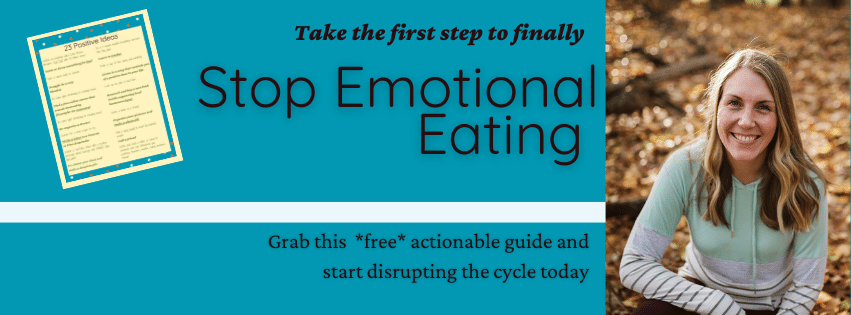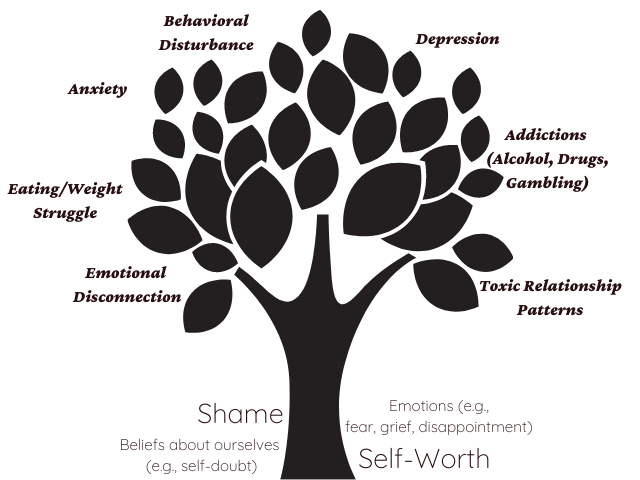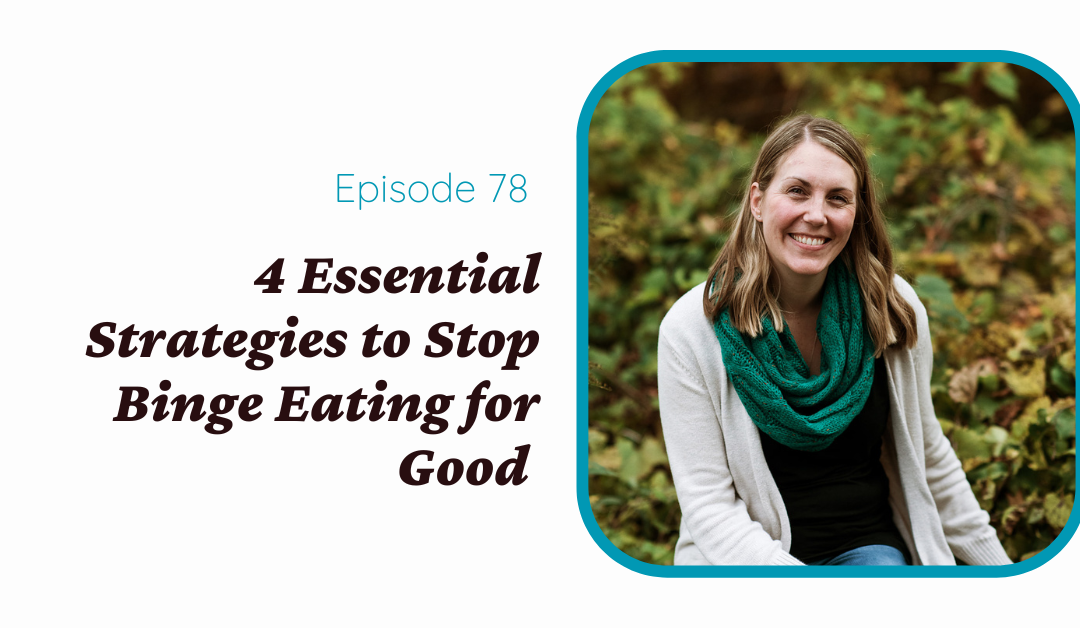Podcast: Play in new window | Download
Subscribe to Motivation Made Easy! Apple Podcasts | Google Podcasts | Spotify | RSS | More
“I know what I need to do to [stop binge eating/emotional eating], I’m just not doing it.”
If I had a dollar for every time a client said that to me, I’d be a very rich woman.
I’m here to tell you, all the knowledge in the world probably won’t be enough.
I should know.
I got my Ph.D. in Clinical Psychology studying weight management and binge eating.
And even after all of that, I couldn’t solve my own binge eating and what I thought of as my “weight issue.”
As I was binge eating and gaining weight, my internal dialogue sounded like…
- “I know what I need to do, I’m just not doing it.”
- “There must be something wrong with me.”
Now I know the truth. The truth is there’s something wrong with the system.
Are you ready to stop binge eating permanently?
If you feel:
- Out of control or ashamed of your binge eating, emotional eating, or your weight, and
- Are ready to take action with things that will actually help you stop the cycle…
This post is for you.
Hey there. I’m Shawn Hondorp. I’m a clinical psychologist and I’ve studied the psychology of eating behavior since 2008.
In this post, I review the key things that helped me and so many of my clients stop binge eating permanently.
F*ck Coping, Start Healing
I recently learned of a book called F*ck Coping Start Healing.
It’s about healing from anxiety (I haven’t actually read it yet).
But I love the title. Don’t you?
At this point in my life, I’m very tired of quick fixes or surface-level strategies.
During my 13 years of struggle with binge eating, I spent years trying surface-level strategies that left me frustrated and exhausted.
I had many periods of what the medical field would call “remission.” During these periods, which lasted weeks or sometimes months, I wouldn’t binge at all, or I would do so rarely. Or I would only feel slightly out of control.
There was even a period of a little over a year where I felt really at peace with food and myself after I lost weight with Weight Watchers. I thought I was “cured.”
But it never lasted.
Skipping the Band-Aid Solutions
We may be able to help someone who is abusing alcohol to stop drinking temporarily by putting them in a rehab center or by removing all alcohol from their home and taking away their keys.
But is that going to lead to long-term change?
Probably not.
We need to understand the root cause of the drinking to prevent it from happening again.
It’s Normal to Want the Quick Fix
The desire for the quick fix makes perfect sense.
Of course, you want to do things that help you feel good now. Our brains are biologically wired to avoid pain and seek comfort.
When it comes to eating struggles, all of the following offer temporary relief from pain:
- Eating a big bowl of Lucky Charms and watching Bridgerton on Netflix
- Skipping a meal because we are busy at work, and secretly thinking “Good, hopefully, I will lose some weight” and feeling in control
- Planning a next diet or fitness effort
Vulnerability is Courage in You, and Weakness in Me
Do you ever read what others write online and think, “Wow that’s brave, but I could never do that.”
If so, I have been where you are.
Back in 2009, I was deep in my binge eating disorder shame spiral. No one knew how much I was struggling. And I wanted to keep it that way.
I was going to solve this dang problem myself if it was the last thing I did.
And, once I solved it, then maybe I’d share my story.
Ready to Break the Binge Eating Cycle for Good?
Ready to stop avoiding and break the binge eating cycle for good?
The first step is to disrupt the cycle.
My free practical guide has 23 positive ideas for things to do instead of eating. Don’t worry, you won’t find the standard diet culture BS advice (take a walk, have some water!)
Take the first step to finally stop binge eating and grab my free practical guide today!

The Power of One Woman’s Story
I started listening to podcasts in 2008 when I was living in Philadelphia and going to grad school.
I would walk to and from campus every day, often with one of my beloved podcasts playing in my headphones.
Podcast listening wasn’t as convenient as it is today. I had to download the podcasts from my desktop computer to iTunes, and then plug in my iPod and transfer the episodes to it.
It was not a fast process.
But I had a sense there was something for me to gain from this one woman’s story and I just knew I had to keep listening.
I Had All the Tools, or So I Thought
I had access to all the tools and resources related to evidence-based approaches to eating disorders and weight management.
Literally, that’s why I went to Drexel University.
I led groups for NIH-funded weight management trials comparing standard behavioral treatments to more innovative treatments. I read and researched the psychology and biology of eating behavior every day.
I worked with top leaders in the eating disorder and weight management fields.
“Maybe I’m Not Broken…”
Even with access to all these resources, want to know what helped me the most during this time?
Listening to Renee Stephens’ podcast where she shared her story of having a binge eating disorder, eating food out of the trash, and eventually achieving peace and freedom in her relationship with food.
Her struggle made me feel a tiny bit less like a total hypocrite and a fraud.
It took away a tiny bit of my shame. And gave me hope.
Are We Really Helping People?
This was also the time when I really started to question things.
I wasn’t seeing any clients or group members make incredible transformations and achieve long-term peace in their relationship with food.
Maybe it wasn’t me, or the clients, or the research participants that were the ones who were broken at all.
Maybe it’s the system.
“It Will Always Be a Struggle for You.”
One of the things you often hear about in the eating disorder and weight management worlds is if you have an eating disorder, or struggle with your weight, you will probably always struggle.
But don’t worry… you can “learn to “manage it.”
How inspiring <enter eye roll>.
Is it Even Possible to Not Struggle for the Rest of Your Life?
I remember hearing Renee say things I had never heard before, like:
- There’s a positive intention behind every behavior, meaning you are trying to get something good for yourself when you are eating (e.g., freedom from pain, boredom, comfort, etc.)
- Ask yourself “How will eating this make me feel over time?”
- It is possible to feel relaxed around food and at peace with your body
- How do you want to feel in your body?
Glimmers of Hope and Empowerment
At this point in my journey when I was listening to Renee’s story, I was still in a diet mentality in many ways. However, I found it really helpful to ask myself some of the above questions.
For the first time, I started to really make a conscious choice to eat or not from a place of self-respect and care.
I found myself passing up the extra donuts left in the lab, not due to concern about calories, but instead due to knowing how I’d feel– really sluggish and unproductive over the next several hours.
For once, I actually felt a little empowered. And a little hope. Maybe I could heal myself fully (not just “manage”).
Something Was Still Keeping Me Stuck
Despite making some improvements with my eating, I was still pretty stuck and binge eating with some regularity. And still incredibly ashamed.
Without realizing it, I was still in a diet mentality and restrictive mindset, even though if you’d asked me at that time, I’d tell you:
- “I definitely don’t diet. Diets don’t work. I’m just trying to eat to feel good in my body.”
- “I do not restrict myself from any food.” (I didn’t limit any foods, but I was still in a restrictive mindset)
- “I never skip meals.” (I literally never did)
The Things Still Keeping Me Stuck in the Binge Cycle…
1. I was still focused on weight loss.
Without realizing it, I was still really hoping that eating in this way would help me lose weight.
In hindsight, there were a few things about “The Inside Out Weight Loss” podcast that were unhelpful for me.
First, the name of the podcast itself indicated that weight loss was the most important goal (and was still in our control).
Second, Renee would often use the term “naturally slender” to describe people we would want to aspire to be like. (Example: “You know, those people we love to hate who seem to be able to eat anything they want and are always slim” was often said.)
The Podcast Wasn’t Immune to the “Thinner is Better” Mantra
This podcast, like most things, was influenced by diet culture and the idea that thinner bodies are the “best” body type. It made several inaccurate assumptions, like:
- “We should all strive to be naturally slender.”
- “If you do the work to take great care of yourself, you will naturally become thin!”
It completely ignores reality. For many people, eating intuitively and remaining in tune with their bodies, their bodies remain a shape other than “slender.”
Without realizing it, this podcast reinforced the idea that we are all taught.
Thinner is better. It’s the way to be. “Healthier.”
Although the podcast has many great messages about listening to your body, trusting it, and loving yourself, those messages were somewhat drowned out.
And since I wasn’t automatically becoming “naturally slender” based on following the strategies, I still felt I wasn’t “fixed.”
2. I was still alone on this journey.
The second thing that kept me stuck was my deep shame about my struggle. It caused me to keep to myself and continue to try to “solve it myself.”
Unfortunately, I waited way too long to seek therapy, with the exception of a few sporadic counseling center visits.
I simply never got to the root of the tree.

Enter Intuitive Eating
I am incredibly grateful I found Intuitive Eating a few years later. With some additional time and work, I finally ditched the diet mentality (aka restrictive mindset) and stopped binge eating for good.
The diet mentality was an invisible string with a tight grip. I couldn’t see it, but just when I would make progress, I would get pulled back into the binge-restrict pattern.
And looking back, this was 100% caused by secretive and sneaky restrictive mindsets that I truly had zero ideas were there.
These subtle judgments I had about eating something “unhealthy” would lead me to binge on the food because my brain interpreted the judgment as restriction and future starvation.
Things That Were Actually Helpful In Breaking Free of Binge Eating
I haven’t had a binge episode since 2014.
The peace around food and my body is beyond what I could have hoped for.
I bring direct evidence against the statement, “Once you have an eating disorder, you will always struggle with it.”
As I reflect on my journey and what was most helpful, it boils down to four main things:
- Hearing stories of others who shared my struggle, and achieved what I wanted. Hearing that Renee Stephens, a high achieving executive, felt completely out of control and hopeless with food but she came out on the other side a happy, vibrant, energetic soul who had peace with food and the courage to share her story openly. Many others have shared their stories of achieving peace and freedom with food and building courageous and connected lives on the blog. Listen to their stories here. See yourself in them. And remember: You are not alone. There is nothing wrong with you. You are not broken. And you can break free of the cycle too.
- Learning about Intuitive Eating, the impact of Diet Culture, and my hidden restrictive mindset. This was pivotal for me and the final difference that actually cut the invisible diet mentality cord. Without realizing it, I still was focused on weight loss, what I thought was “being healthy”, and judging myself for my choices, which was causing my binge eating. Reading and learning Intuitive Eating helped me finally give this up for good, and I’ve never felt better physically or emotionally. More importantly, I’ve never felt more connected with the people in my life, or better able to handle difficult emotions underlying all the diet cycle BS.
- Realizing it was never about food. For years, I was convinced I was semi-addicted to sugary foods like cereal and cake. Now, I know that my brain was restricted and I had no idea. I still like food. It’s tasty and I love having ice cream or cake or pizza whenever I want with my kids, and with zero guilt. But it is also, just food. I don’t live for it anymore. I rarely think about it, versus it being something I thought about all day long. It no longer holds any power over me. And now that I’m not distracted by the binge-restrict cycle, I focus on some of the real struggles I have, like difficulty asking for what I need, setting boundaries, and valuing myself (and learning why this became so hard for me in the first place). I’m healing actual sh*t I have control over, and it feels incredible.
- Asking for help in the right places and sharing my story. For me, this meant going to therapy regularly and working through some of the roots of my tree. I worked to better understand myself, my strong emotions, my shame, and how to move towards a life I truly wanted. I learned why I struggled with asking for help and saying no. I learned how to value myself unconditionally. I learned I have worth regardless of what I do, who I care for, and what I achieve. I couldn’t do it alone. And now I realize, we aren’t meant to. Now, when I need support or help, I find a way to get it.
It’s never too late to stop dieting and start living. For good.
Your Why is Hidden in Your Story
Ready to unpack your story for real this time?
We are planning some super cool workshops and opportunities to learn and grow in community just for you!
Sign up today to be notified about these inspired offerings!
Join the Community
Disclaimer: This blog and podcast is for informational and educational purposes only. It is not a substitute for individual professional advice or treatment, including medical or mental health advice. It does not constitute a provider-patient relationship.
Disclosure: Using the Bookshop.org links in this post means that I would get an affiliate fee if you purchase from the online bookshop (this supports my business, and local bookstores too!)
